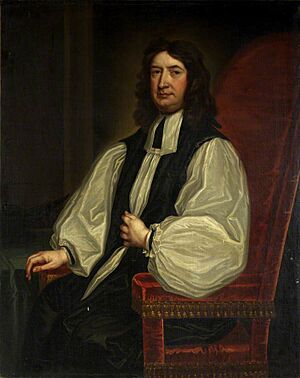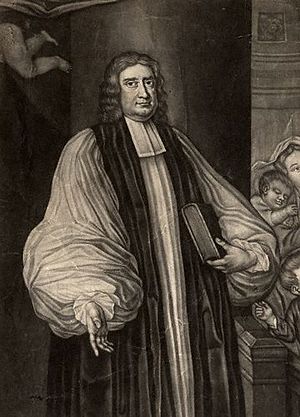Hugh Boulter facts for kids
Quick facts for kids The Most Reverend Hugh Boulter |
|
|---|---|
| Archbishop of Armagh Primate of All Ireland |
|
 |
|
| Appointed | 31 August 1724 |
| In Office | 1724–1742 |
| Predecessor | Thomas Lindsay |
| Successor | John Hoadly |
| Orders | |
| Consecration | 15 November 1719 by William Wake |
| Personal details | |
| Born | 4 January 1672 London, England |
| Died | 27 September 1742 (aged 70) London, England |
| Buried | Westminster Abbey |
| Nationality | English |
| Denomination | Anglican |
| Spouse | Elizabeth Savage |
| Previous post | Bishop of Bristol (1719–1724) |
| Education | Merchant Taylors' School |
| Alma mater | Christ Church, Oxford Magdalen College, Oxford |
Hugh Boulter (born January 4, 1672 – died September 27, 1742) was an important leader in the Church of Ireland. He served as the Archbishop of Armagh and the Primate of All Ireland from 1724 until he passed away. This meant he was the most senior bishop in the Church of Ireland. Before that, he was also a chaplain (a religious advisor) to King George I starting in 1719.
Contents
Early Life and Education
Hugh Boulter was born in London, England. His father, John Boulter, was a well-respected man. Hugh went to Merchant Taylors' School for his early education.
After school, he attended Christ Church, Oxford, which is a famous university. He stayed there for one year. Then, he moved to Magdalen College, another part of Oxford University, to continue his studies.
His Career as a Church Leader
After finishing university in 1700, Hugh Boulter worked as a chaplain for several important people. These included Sir Charles Hedges, a government official, and Thomas Tenison, who was the Archbishop of Canterbury. In 1708, he earned his Doctor of Divinity (D.D.) degree, which is a high honor in religious studies.
For seven years, Boulter worked as a rector, leading a local church. In 1715, he became the archdeacon of Surrey, another important church role.
In 1719, Hugh Boulter was chosen to be the Dean of Christ Church and the Bishop of Bristol. A bishop is a senior member of the Christian clergy.
Becoming Archbishop of Armagh
In 1724, Boulter was offered the top position in the Church of Ireland: Archbishop of Armagh. Some people thought another person, William King, should have gotten the job. King was upset about this decision.
As Archbishop of Armagh, Boulter strongly believed that important jobs in Ireland should go to Englishmen. This included positions in law, government, and the church. He thought this would help England keep control in Ireland. Because of this view, he was not very popular with many Irish people.
Boulter also served as one of the Lord Justices eight times between 1726 and 1742. The Lord Justices were officials who governed Ireland when the King's representative was away.
Challenges and Policies
Boulter did not always get his way. For example, he objected when John Rogerson (1676-1741), who was born in Dublin, became the Lord Chief Justice of Ireland in 1727. Boulter did not like Rogerson personally and preferred an English judge.
Boulter's policies also affected Roman Catholics in Ireland. He supported laws that limited their rights. For instance, a law passed with his influence stopped Catholics from working in law. Another law prevented them from voting in elections. These actions were often viewed with suspicion by many Irish people, including the famous writer Jonathan Swift.
Helping People in Need
Despite some of his unpopular policies, Boulter also did good work. When there was a bad harvest in Ulster in 1729, he bought food and sent it to the region to help people. He also worked hard to help during the Great Irish Famine (1740-1741), a terrible time when many people in Ireland faced starvation.
Supporting Education
Boulter was interested in education. In 1731, he looked into schools that were not officially approved. He also supported setting up a system of charter schools. These schools aimed to teach children of Catholic families the English language and the principles of the Protestant religion.
In 1731, a request was sent to King George II to start these schools, and the King agreed in 1733. Boulter himself gave £400 to help build a charter school for girls in Santry, Dublin.
In 1738, he helped pass a bill that changed the value of gold coins. This change was meant to benefit poorer people.
 | Selma Burke |
 | Pauline Powell Burns |
 | Frederick J. Brown |
 | Robert Blackburn |


